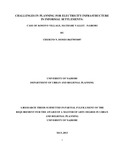| dc.description.abstract | Development efforts in Kenya and other third world countries has for quite some time overlooked the slums areas. This has been majorly attributed to the illegality of the settlements and insecure land tenure systems. This continued trend and ignorance of the fact that informal settlements exist has led to worsening of the situation in the settlements as the population continues to grow. On the other hand, the local authorities continue to be overstretched in terms of providing basic services such as electricity and water.
This research was carried out in Kosovo Village, one of the informal settlements in Kenya within the precincts of the city of Nairobi. The study highlighted the main causes and challenges in planning for electricity infrastructure within the settlements and planning interventions to the current situation.
The research in examining the challenges facing planning for electricity infrastructure in Kosovo was contacted through a well thought data collection and analysis process. Issues of lack of designated space for service provision and deliberate encroachment into wayleaves were observed. Faulty and probably illegal wiring or use of flammable energy alternatives when the power is cut off can cause devastating fires, destroying homes and displacing, killing, or injuring of thousands of people as it has been the case in some parts of Mathare.
In this endeavor, the study established that the main challenge was competition for the limited space by different land uses. The landlords otherwise known as structure owners, due to limited space in the area build houses under the transmission lines to cater for the demand of cheaper housing, and this is done in full knowledge of the restrictions and dangers associated with the power line. Different policies of the government are also at fault of the current situation as they have overlooked the seriousness of the slums and the subsequent service provision.
The research findings and recommendations provide interventions to synthesize competing land uses and improve the situation on the ground, while at the same time looking at policy and regulatory framework. Overlooking the economic status and livelihoods of the people will also lead to failure as suggested in the research recommendations. | en |

